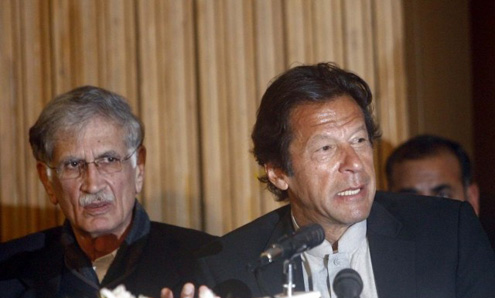 The three Pakistani cricketers at the centre of spot-fixing allegations could face life bans from the game after they were on Thursday night charged with multiple breaches of the International Cricket Council’s anti-corruption rules and suspended from all cricket with immediate effect. Test captain Salman Butt and bowlers Mohammad Asif and Mohammad Amir were informed of the charges on Thursday night and become the first players to be suspended under new ICC rules intended to protect the integrity of the game.
The three Pakistani cricketers at the centre of spot-fixing allegations could face life bans from the game after they were on Thursday night charged with multiple breaches of the International Cricket Council’s anti-corruption rules and suspended from all cricket with immediate effect. Test captain Salman Butt and bowlers Mohammad Asif and Mohammad Amir were informed of the charges on Thursday night and become the first players to be suspended under new ICC rules intended to protect the integrity of the game.
If found guilty they face lengthy expulsion from the game, with ICC chief executive Haroon Lorgat warning that life bans could result. They could face even stiffer action as the result of the ongoing criminal inquiry, which will accelerate on Friday when the trio will be interviewed under caution by detectives from Scotland Yard.
On Thursday they protested their innocence for the first time since the scandal broke, but are currently being viewed as suspects in the alleged conspiracy. They are not expected to be arrested however, and have agreed to attend the interviews voluntarily.
It was reported on Thursday night that marked bank notes were allegedly discovered in police searches of Butt’s hotel room and his locker at Lord’s cricket ground.
The ICC’s decision to charge and suspend the players came after officials from its Anti-Corruption Unit, led by chief operating office Ravi Sawani, held talks with officers from the Metropolitan Police Economic Crime Unit.
The ICC had initially indicated that it would not act until the police had interviewed the players, but having examined some of the evidence already gathered against the three, and been assured that disciplinary action would not prejudice the police inquiry, they cleared the way for ICC charges to be levelled. Sir Ronnie Flanagan, the chairman of the ACSU, was also involved in the discussions.
The ICC’s code prohibits “fixing or contriving in any way – the result, progress, conduct or any other aspect of any international match”, a wording that clearly covers the deliberate bowling of no-balls of which the Pakistan players stand accused.
The decision to suspend the players pending the outcome of the disciplinary action under new rules introduced last year is a measure of the seriousness with which the ICC is treating the case.
Previously players were free to play on pending the outcome of disciplinary action, which in this case would have been disastrous for the game’s reputation.
The ICC has also acted with commendable speed to try and retake control of events that have the power to cause huge damage to the reputation of the game. The swiftness of the charges, levelled before the police inquiry is complete, indicates that the evidence against the three men is compelling.
Lorgat said on Thursday night: “We will not tolerate corruption in cricket – simple as that. We must be decisive with such matters and if proven, these offences carry serious penalties up to a life ban. The ICC will do everything possible to keep such conduct out of the game and we will stop at nothing to protect the sport’s integrity.”
The charges came at the end of a hectic day that saw the players forced to withdraw from Pakistan’s squad for the one-day series against England before the charges were levelled in an attempt to save face.
The official line from the Pakistan camp, announced by Pakistan’s High Commissioner to London Wajid Shamsul Hasan after a meeting with the players, was that they the “mental torture” of the last week meant they were not “in the right frame of mind” to play.
“The players said they are entirely innocent in the whole episode and shall defend their innocence as such,” Hasan said.
In fact the players’ withdrawal was only secured after a round of intense negotiations on Wednesday night between the Pakistan Cricket Board chairman and the ECB and ICC.
Both the ECB and the ICC have insisted that the players could not feature in the one-day games if the series was to have any credibility, and they believed that had the support of the PCB following two days of talks in London.
Late on Wednesday however PCB president Ijaz Butt suggested that as the players had not been charged with any offence they would be available for selection this weekend.
While his comments may have been directed at his domestic audience, they sparked an angry response from ECB chairman Giles Clarke, who has staked a considerable amount of personal time and credibility on helping the rehabilitation of Pakistan cricket this summer.
Clarke is understood to have made it clear to Butt that the trio’s participation would not be countenanced, a view endorsed by Lorgat, who flew into London on Wednesday morning and joined Clarke in negotiations.
Eventually their view prevailed and the Pakistan camp agreed to withdraw the players. To save face it was framed as a personal choice, but one source described suggestions that the players had chosen to step down as “complete nonsense” – Telegraph











